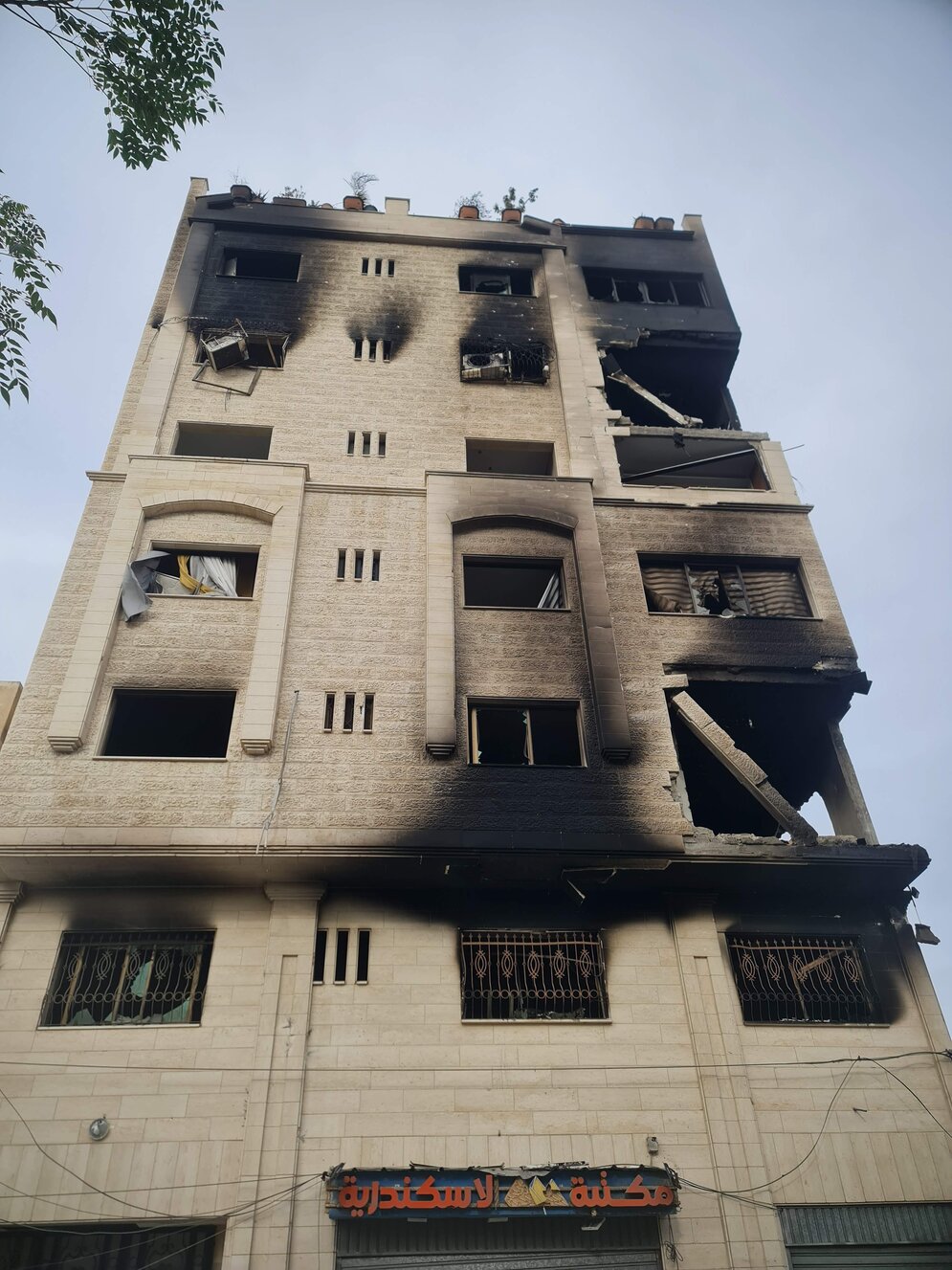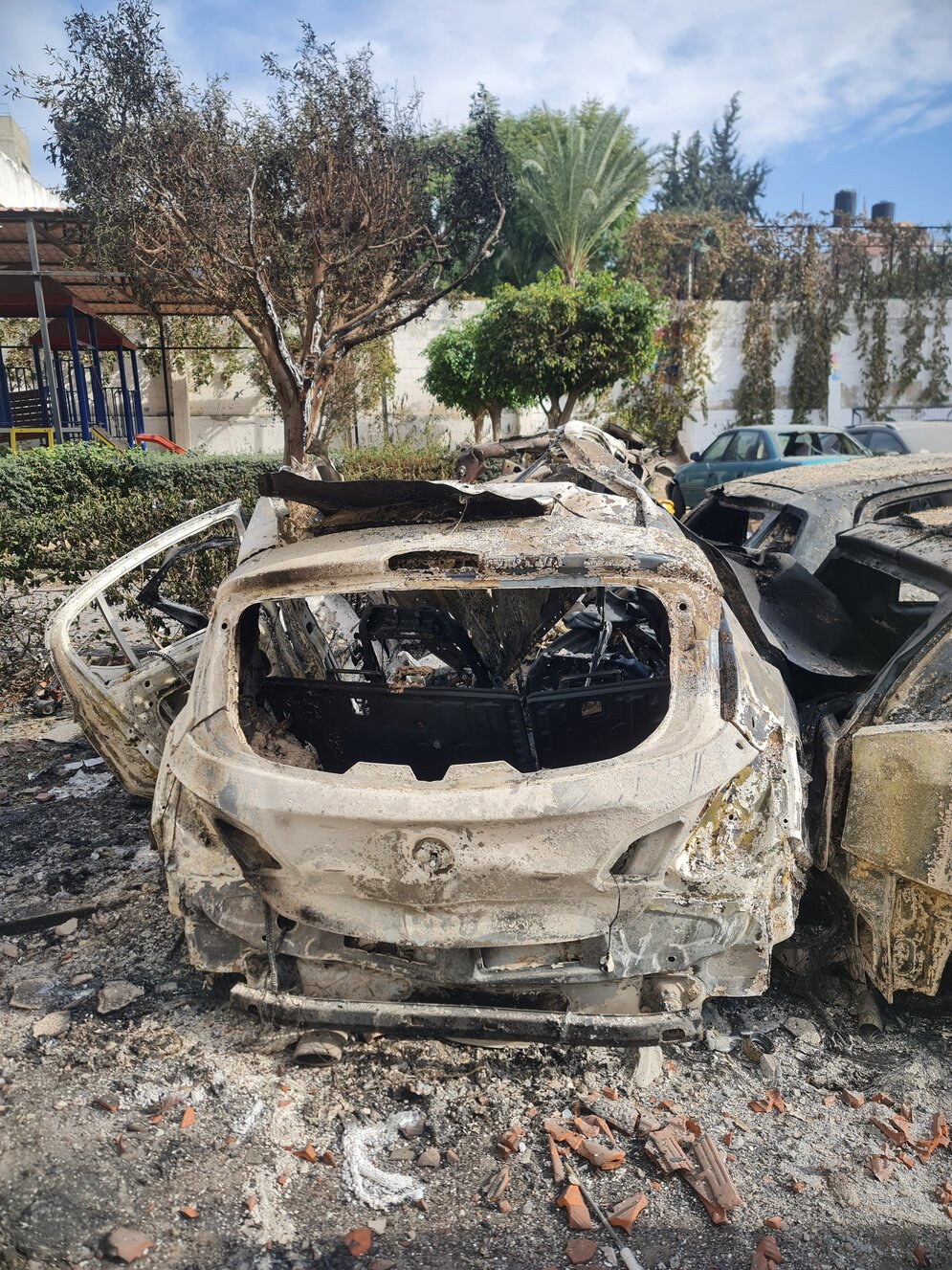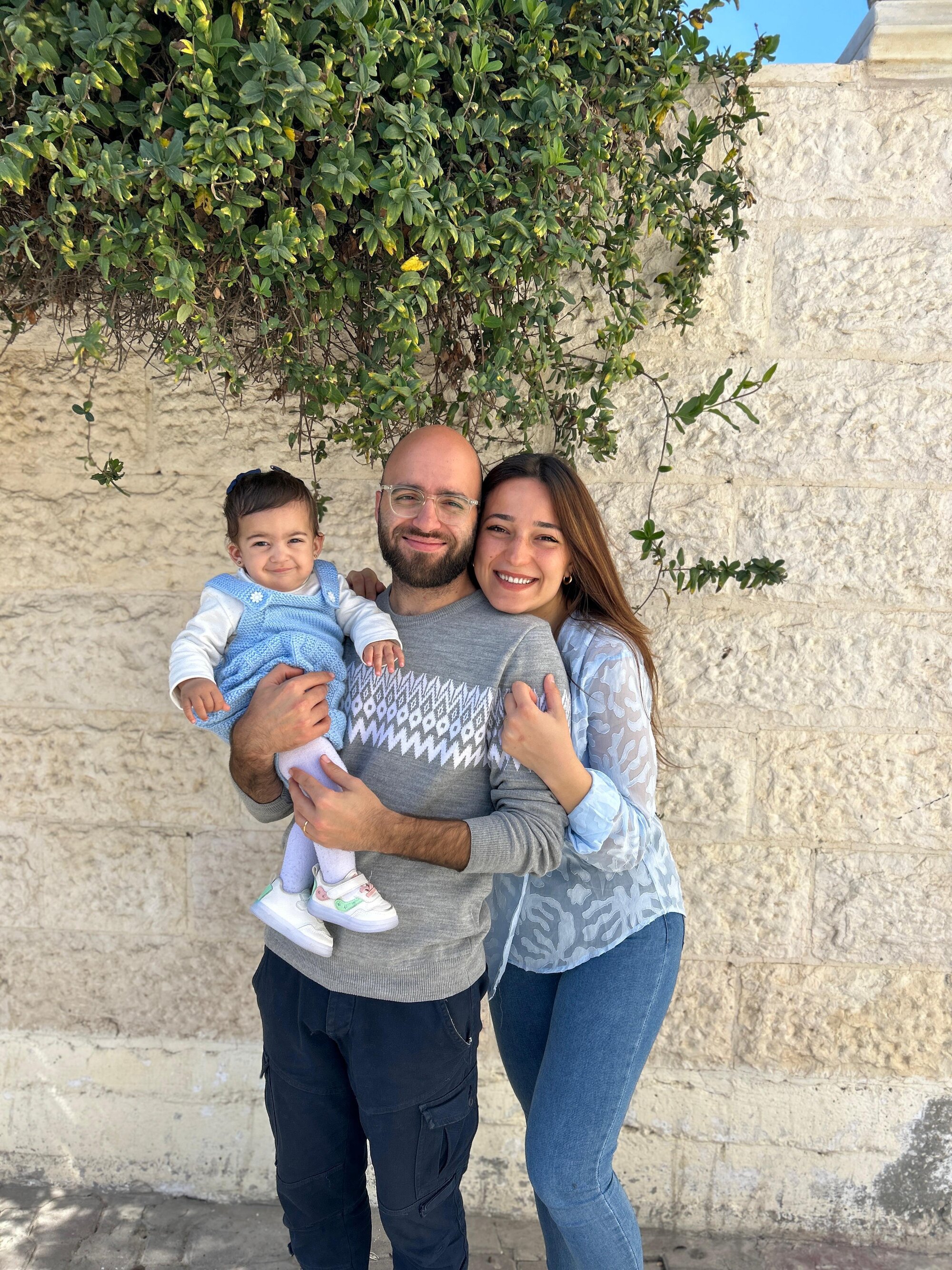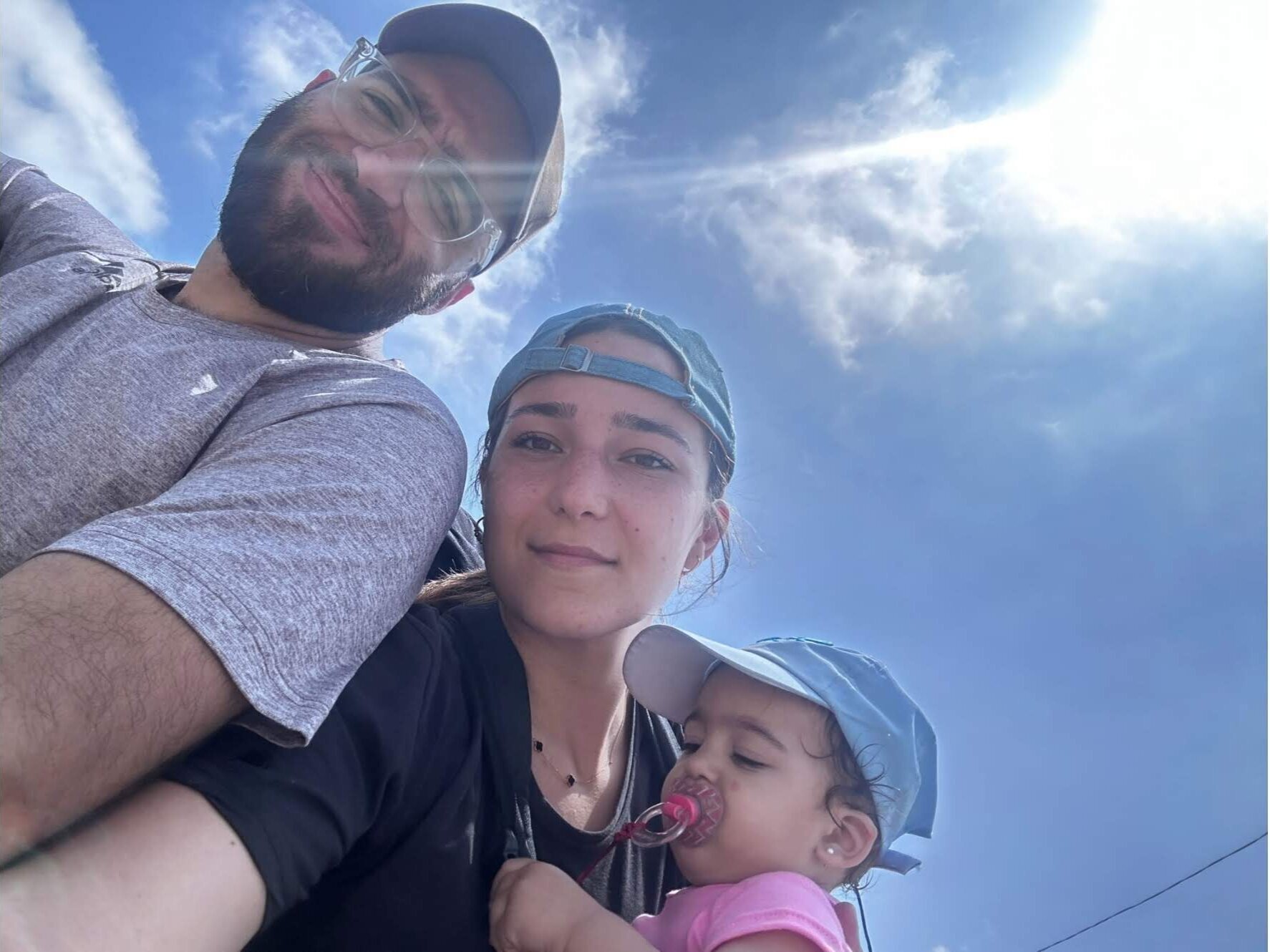“Will We Ever Be Able To Go Home?”
Rami and Maryan escaped Gaza to ensure their baby daughter’s safety. Now, like the vast majority of displaced Gazans, they face a painful decision about whether to start a new life elsewhere.

In a one-room studio in Egypt, Rami, Maryan and their baby daughter, Kylie, are taking refuge again. It is easy to see the whole place in a single glance. A bed, a small closet, a couch, a television, a sink, and a refrigerator crammed together. The only private space is a toilet behind drywall. “This is our home now,” says Rami, 32, a humanitarian worker from Gaza. He smiles sadly. “At least it is much better than the last place we were in.” A few days after 7 October last year, Rami and his wife, Maryan, fled from their spacious home in Gaza to escape the bombardment. Kylie was only two months old. The young family took shelter with 400 other displaced people in the Greek Orthodox Church in Gaza. They thought they would be able to go home within days, but their church stay lasted seven-and-a-half months. They did not realize it would be impossible to return to their former life.
The family has been in Egypt since last May after making a perilous escape across the Rafah border. The studio is in a crowded district of Cairo. The area never sleeps, says Rami, but being in such an atmosphere feels familiar. In Gaza, they experienced what it was like to be unable to sleep in impossibly cramped conditions. The difference is that in Cairo, the overcrowding and sleeplessness are signs of life, while in Gaza they were signs of potential death. The hardest time in the church was the bombing on 19 October. Eighteen people were killed that night, including Maryan’s brother-in-law. Her sister and two nephews were under the rubble for hours. After the first strike, her sister’s husband covered his younger son with his body to protect him. “It took over ten hours to get the bodies out. They were white from all the dust,” says Maryan, who was a student of English Literature at a university in Gaza. “When my older nephew got out, he screamed, ‘My brother is moving, but my father is dead on top of him.’”


As she speaks, Maryan turns on a show for toddlers featuring American YouTuber Ms. Rachel to distract Kylie, who is now almost one year old. Against a vibrant background, Ms. Rachel cheerfully repeats words like Mama or Dada in a singsong voice. “Ms. Rachel is our saviour. Our daughter loves her,” says Maryan, who is wearing a black dress and a pendant of black roses. There were many other unbearable losses. “A mother lost her three children. Every night, for several months after the bombing, she would go to the place where they died and call their names,” Maryan recalls. Following the attack, all the Christians in the church who had young babies, a total of nine, decided to baptize them in case they got killed.
While dealing with their grief, conditions inside the church were harsh. Rami lost 25 kilograms due to the lack of food. “For a long period, we did not see any kind of vegetables,” says Maryan. “After several months, we got tomatoes, and each person got exactly two slices. We were very happy.” Although disputes sometimes broke out about precious commodities such as water, the couple say they were moved by how all the people in the church looked after each other. They eventually made the difficult decision to risk the journey south to cross the border into Egypt. The route towards the south of Gaza was full of dangers. The couple walked about seven kilometres while carrying their baby and heavy bags. “We did not stop. Other people were stopping to rest, but we kept moving,” Maryan says. Not everyone was lucky enough to survive. Days ahead of them, an eighteen-year-old girl died on the roadside from dehydration.
Making it to the safety of Cairo was a relief, says Rami, but like thousands of other displaced Gazans the uncertainty and fear remains. The couple worry about their families in Gaza, who they had to leave behind. Both clutch their phones hoping to hear news from them. “I’m trying to reach my younger brother because it’s his sixteenth birthday today,” says Maryan. “I just want to talk to him.” Rami and Maryan are among the few to secure visas to travel to Australia and then they will decide their next move. They have put thoughts of returning to Gaza out of their minds because, they say, holding on to hope is too painful. But they don’t know whether their parents and siblings will be able to escape Gaza and join them.
The idea of such a huge life change is overwhelming. The couple have had to leave behind not only their families, but their tiny community of Christians in Gaza as well. “There were only 900 Christians left in Gaza before 7 October. Now most of them will be leaving forever. It is very sad,” says Rami. The couple has also had to come to terms with losing their beloved home. “We put all our savings into our beautiful apartment. We both love interior design and it took years to decorate it the way we wanted,” says Rami. While staying at the church, Rami returned to their building to find it had been virtually destroyed, along with most of the surrounding houses. Their car was a burnt-out wreck. “It is unbelievable how you could suddenly lose everything you own and have to start all over again,” Rami adds.
Maryan and Rami believe that the main priority is the safety of their daughter. Maryan reflected on the moment they made their decision to leave, “Five months had passed. It was midnight. Rami questioned the idea of us staying after everyone and everything we lost. I looked at him and told him that he was right. We need to leave, for our daughter. She deserves a future. She deserves to be safe.” It hurts them that their daughter will not grow up in their homeland and will miss out on local traditions. But at least she will be alive and one day, hopefully, be able to return and enjoy a calm evening under a Palestinian olive tree.

This article was written in June 2024. Rami, Maryan and their daughter have since made it safely to Australia, where they are deciding on their future. Despite the announcement of a ceasefire in Gaza in January 2025, the peace remains extremely fragile and the lives of most Gazans remain in limbo. Many people, including Rami and Maryan, are unable to return to their homes as their former neighbourhoods now lie in rubble.



